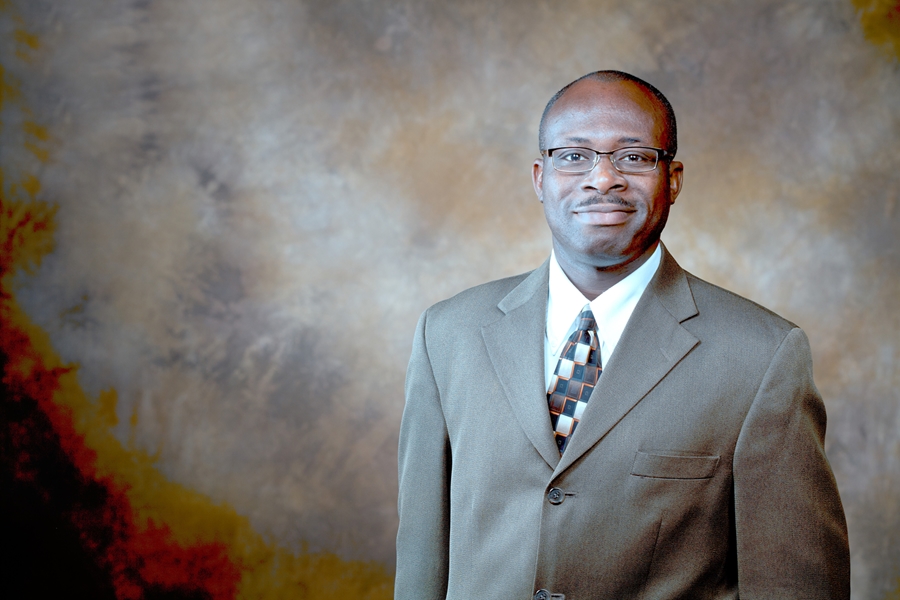
FAYETTEVILLE, Ark. – Godwin-Charles Ogbeide, associate professor of hospitality innovation in the University of Arkansas' Dale Bumpers College of Agricultural, Food and Life Sciences, has been featured in Convene magazine and has written an article for another publication.
In a recent issue of Convene, Ogbeide was cited for "What Makes for Good Internships?" and he wrote a piece for Communique, the newsletter for the International Council on Hotel, Restaurant and Institutional Education. Convene is a leading meetings industry publication for educational and professional development. ICHRIE is the professional association for hospitality and tourism.
In Convene, Ogbeide said Bumpers College hospitality innovation students, who are required to plan at least two events before graduation, have reported some internships do not give them enough to do or tasks included pouring coffee and cleaning bathrooms.
"These are things that are not relevant to what they expect to be doing as an intern or as a future manager or director," he said in the story. "It would be nice for those who really need interns to really need interns. When we send our students out there, they are ready. You test them, see how good they are in some of the things that you expect them to be able to do, then you know they're ready. You know their strengths and weaknesses, and you can base the task you assigned to them around their strengths and weaknesses."
The story included 10 essential experiences for interns with half the list coming from Ogbeide: working with stakeholders, negotiating and managing contracts, risk management, budgeting and event marketing.
"We have some great opportunities with internships because our students can affiliate themselves with hotels, restaurants and event-management companies," said Ogbeide. "Students will apply for an internship because it offers exactly the competencies they want or vice versa. And a good internship is always accompanied by an evaluation from the direct supervisor."
Hospitality innovation students are evaluated at the middle of internships and the end to see if they are learning and performing, and what needs improvement.
In the ICHRIE Communique publication, Ogbeide suggested innovative education approaches for Millennial students. Technology plays a role, and could overcome barriers to mobility and access of some student groups. "Technology and other innovations can also help hospitality and tourism programs shift to a more 'learner-centered' approach to education" with videos and audio recordings incorporated into classrooms and online.
He said apps on cell phones could be used to ask questions during lectures or engage in critical discussion without reservation, allowing for real time feedback.
Another possibility is experiential in-class learning for case studies and small groups, which could help students grasp concepts and "enhance student learning of managerial skills, and technical hospitality and tourism skills concurrently."
About the Dale Bumpers College of Agricultural, Food and Life Sciences: Bumpers College provides life-changing opportunities to position and prepare graduates who will be leaders in the businesses associated with foods, family, the environment, agriculture, sustainability and human quality of life; and who will be first-choice candidates of employers looking for leaders, innovators, policy makers and entrepreneurs. The college is named for Dale Bumpers, former Arkansas governor and longtime U.S. senator who made the state prominent in national and international agriculture.
About the University of Arkansas: The University of Arkansas provides an internationally competitive education for undergraduate and graduate students in more than 200 academic programs. The university contributes new knowledge, economic development, basic and applied research, and creative activity while also providing service to academic and professional disciplines. The Carnegie Foundation classifies the University of Arkansas among only 2 percent of universities in America that have the highest level of research activity. U.S. News & World Report ranks the University of Arkansas among its top American public research universities. Founded in 1871, the University of Arkansas comprises 10 colleges and schools and maintains a low student-to-faculty ratio that promotes personal attention and close mentoring.
Contacts
Robby Edwards, director of communications
Dale Bumpers College of Agricultural, Food and Life Sciences
479-575-4625, robbye@uark.edu